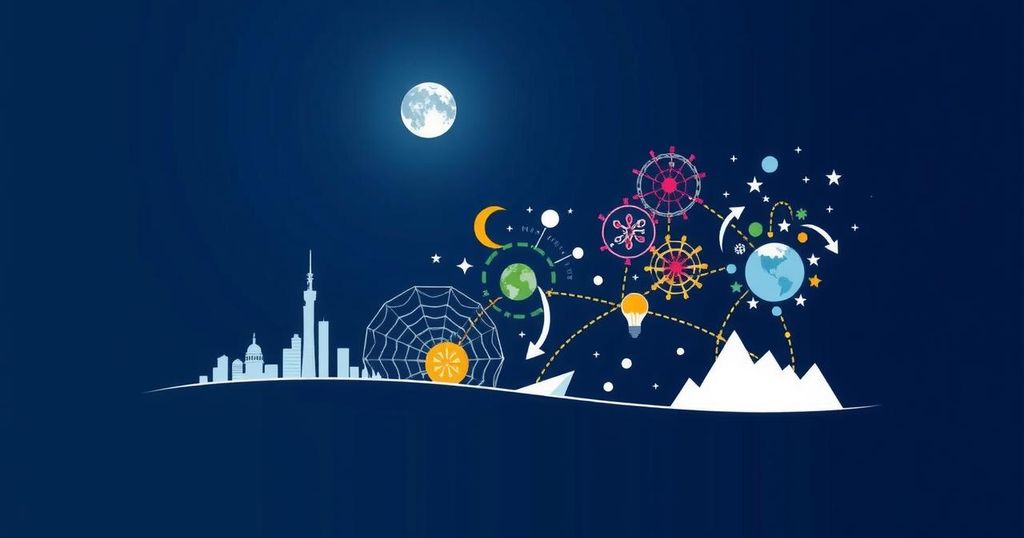Fourteen UConn students attended COP29 in Baku, Azerbaijan, enhancing their understanding of climate change negotiations. The conference highlighted both the challenges of fossil fuel interests and the hopeful exchanges on sustainability. Attendees engaged with influential figures and explored varying perspectives on climate solutions, culminating in an invitation to share experiences at the upcoming Climate Change Cafe.
Fourteen student fellows from the University of Connecticut (UConn) attended the 29th United Nations Climate Change Conference (COP29) held in Baku, Azerbaijan, this November, under the auspices of the Office of Sustainability. Since COP21 in 2015, UConn has actively participated in this global summit aimed at addressing climate change solutions. Many attendees were new to the conference and made various preparations to maximize their experience.
Dylan Steer, a senior majoring in environmental studies and political science, expressed his enthusiasm for being approved to attend COP29 after unsuccessful attempts in previous years. He proactively engaged with former attendees to understand the atmosphere of the conference and the experience of being in a city bustling with climate advocates. Kamala Chuss, also a senior, shared her lifelong commitment to conservation, highlighting the importance of her studies in preparation for the conference.
Alan Cavagnaro, another senior majoring in political science with a focus on Urban and Community Studies, mentioned that attendees with critical viewpoints faced close scrutiny before arriving at the summit. He cited a government communication that mandated prior registration for any protests.
The conference unfolded over two weeks, with the initial week reserved for officially recognized UN parties. During the second week, which commenced on November 18, UConn students navigated between the Blue Zone—which hosted negotiations and panels—and the Green Zone, which showcased sustainability initiatives. Cavagnaro noted a stark difference in the environments of both zones, deeming the Blue Zone much more engaging compared to the Green Zone, which he found quite disheartening due to its representation of fossil fuel interests attempting to appear environmentally friendly.
Steer highlighted the deceptive nature of some corporate representations at COP, particularly criticizing the SOCAR energy company for its misleading claims of sustainability amidst its contributions to fossil fuel projects. In contrast, Chuss found the Blue Zone insightful, especially at the Ocean Pavilion, where she acquired knowledge of international negotiations and the application of scientific research.
Cavagnaro pointed to the poignant remarks made by the Attorney General of Fiji regarding the difficulties faced by developing nations in enacting climate solutions. He emphasized the need for tangible assistance to enable these nations to meet climate goals outlined in the Paris Agreement. Notably, all attendees appreciated the People’s Plenary, where voices from conflicted regions offered candid perspectives on the intersection of climate change and international conflicts.
To further elaborate on their experiences at COP29, the UConn attendees invite the community to a Climate Change Cafe, scheduled for December 4 in the Student Union Ballroom, from 4:00 PM to 6:00 PM.
The United Nations Climate Change Conference, commonly referred to as COP, is an annual gathering aimed at bringing together world leaders, experts, and activists to negotiate and discuss strategies to combat climate change. COP29, held in Baku, Azerbaijan, marked the continuation of this critical dialogue which began with COP21 in Paris in 2015. Student participation has become a vital element, providing fresh perspectives and advocating for climate action on an international platform, reflecting the growing involvement of youth in sustainability initiatives.
In summary, UConn’s participation in COP29 allows students to gain invaluable insights into the complexities of international climate negotiations and the broader implications of climate policies. The diverse experiences shared by attendees underscore both the challenges and opportunities present at such conferences, highlighting the importance of continued advocacy and engagement in climate actions. Their invitation to the Climate Change Cafe serves as an opportunity for further dialogue on these pressing issues.
Original Source: dailycampus.com






